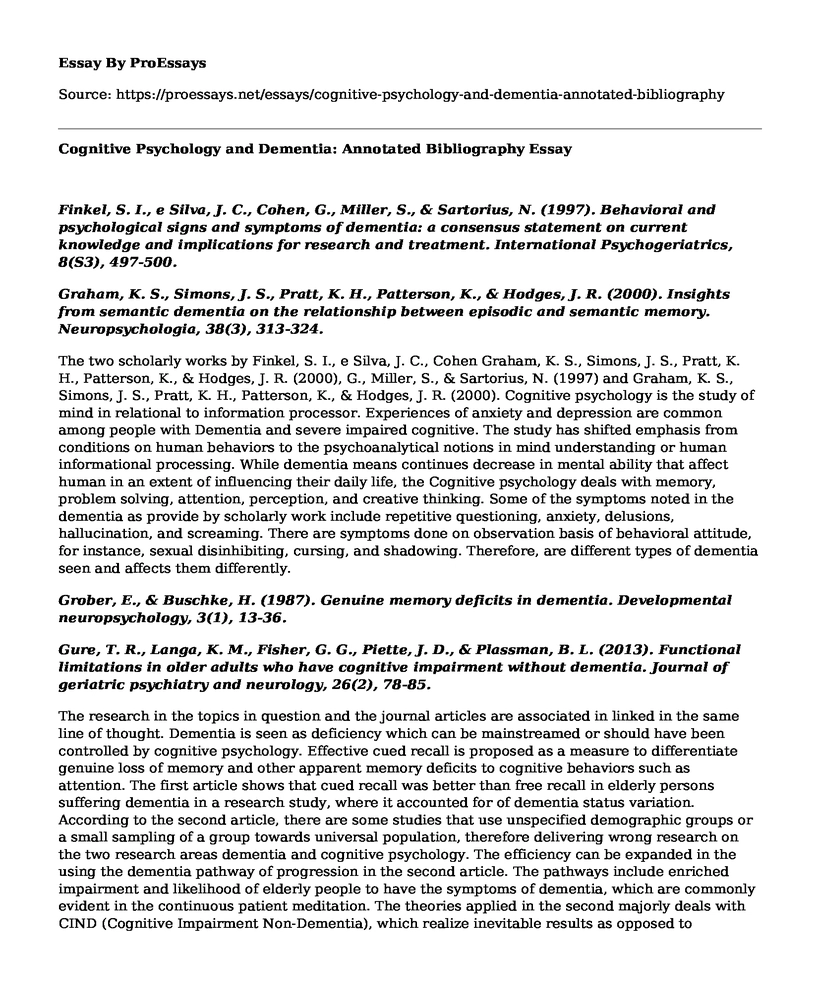Finkel, S. I., e Silva, J. C., Cohen, G., Miller, S., & Sartorius, N. (1997). Behavioral and psychological signs and symptoms of dementia: a consensus statement on current knowledge and implications for research and treatment. International Psychogeriatrics, 8(S3), 497-500.
Graham, K. S., Simons, J. S., Pratt, K. H., Patterson, K., & Hodges, J. R. (2000). Insights from semantic dementia on the relationship between episodic and semantic memory. Neuropsychologia, 38(3), 313-324.
The two scholarly works by Finkel, S. I., e Silva, J. C., Cohen Graham, K. S., Simons, J. S., Pratt, K. H., Patterson, K., & Hodges, J. R. (2000), G., Miller, S., & Sartorius, N. (1997) and Graham, K. S., Simons, J. S., Pratt, K. H., Patterson, K., & Hodges, J. R. (2000). Cognitive psychology is the study of mind in relational to information processor. Experiences of anxiety and depression are common among people with Dementia and severe impaired cognitive. The study has shifted emphasis from conditions on human behaviors to the psychoanalytical notions in mind understanding or human informational processing. While dementia means continues decrease in mental ability that affect human in an extent of influencing their daily life, the Cognitive psychology deals with memory, problem solving, attention, perception, and creative thinking. Some of the symptoms noted in the dementia as provide by scholarly work include repetitive questioning, anxiety, delusions, hallucination, and screaming. There are symptoms done on observation basis of behavioral attitude, for instance, sexual disinhibiting, cursing, and shadowing. Therefore, are different types of dementia seen and affects them differently.
Grober, E., & Buschke, H. (1987). Genuine memory deficits in dementia. Developmental neuropsychology, 3(1), 13-36.
Gure, T. R., Langa, K. M., Fisher, G. G., Piette, J. D., & Plassman, B. L. (2013). Functional limitations in older adults who have cognitive impairment without dementia. Journal of geriatric psychiatry and neurology, 26(2), 78-85.
The research in the topics in question and the journal articles are associated in linked in the same line of thought. Dementia is seen as deficiency which can be mainstreamed or should have been controlled by cognitive psychology. Effective cued recall is proposed as a measure to differentiate genuine loss of memory and other apparent memory deficits to cognitive behaviors such as attention. The first article shows that cued recall was better than free recall in elderly persons suffering dementia in a research study, where it accounted for of dementia status variation. According to the second article, there are some studies that use unspecified demographic groups or a small sampling of a group towards universal population, therefore delivering wrong research on the two research areas dementia and cognitive psychology. The efficiency can be expanded in the using the dementia pathway of progression in the second article. The pathways include enriched impairment and likelihood of elderly people to have the symptoms of dementia, which are commonly evident in the continuous patient meditation. The theories applied in the second majorly deals with CIND (Cognitive Impairment Non-Dementia), which realize inevitable results as opposed to predictability.
Reference
Finkel, S. I., e Silva, J. C., Cohen, G., Miller, S., & Sartorius, N. (1997). Behavioral and psychological signs and symptoms of dementia: a consensus statement on current knowledge and implications for research and treatment. International Psychogeriatrics, 8(S3), 497-500.
Graham, K. S., Simons, J. S., Pratt, K. H., Patterson, K., & Hodges, J. R. (2000). Insights from semantic dementia on the relationship between episodic and semantic memory. Neuropsychologia, 38(3), 313-324.
Grober, E., & Buschke, H. (1987). Genuine memory deficits in dementia. Developmental neuropsychology, 3(1), 13-36.
Gure, T. R., Langa, K. M., Fisher, G. G., Piette, J. D., & Plassman, B. L. (2013). Functional limitations in older adults who have cognitive impairment without dementia. Journal of geriatric psychiatry and neurology, 26(2), 78-85.
Cite this page
Cognitive Psychology and Dementia: Annotated Bibliography. (2022, Dec 22). Retrieved from https://proessays.net/essays/cognitive-psychology-and-dementia-annotated-bibliography
If you are the original author of this essay and no longer wish to have it published on the ProEssays website, please click below to request its removal:
- Hand Hygiene among Health Care Workers on Labor and Delivery Unit - Essay Sample
- The Morality of Suicide: The Divergent and Convergent Views
- Paper Example on Binomial and Normal Distribution
- How to Take Effective Breaks Essay Example
- Essay Example on a Strong Sara: Overcoming Insecurity, Loneliness and Depression
- Essay Example on Aged People Suit Best in Upcountry: Physical Attributes at Play.
- Paper Example on Age-Related Changes: Nutritional Challenges & Health Risks







